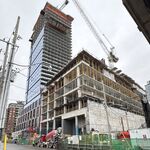unimaginative2
Senior Member
Traditional stores forced out of Queen St. W.
Queen St. W.'s trendy epicentre expands westward, forcing decades-old mom-and-pop stores to close
Oct 01, 2007 04:30 AM
Sandro Contenta
staff reporter
Queen St. W. is haunted by the ghosts of stores past.
They proclaim their fading presence with empty storefronts, commercial signs no one has bothered to take down, or a farewell banner.
"Thank you Queen St. for 64 great years," says a banner at the corner of Peter St., from Cooper's Office Furniture, which recently moved to Bathurst St. to escape a rent hike.
Gentrification, which has transformed a western swath of the street into boutiques, cafés, restaurants and art galleries, continues to push Queen St.'s traditional stores out of business, or off the street.
It has also split traditional businesses still on the street into two groups: those struggling with rocketing rents and those that own buildings now worth a small fortune. Business may be tough for most long-time merchants, but those who own their buildings can at least look forward to a relatively comfortable retirement.
The few hanging on thank loyal customers and the ultimate in niche marketing. In the trendy heart of Queen St. W., between University and Gladstone Aves., shoppers in need of a used traffic light or a wringer washing machine can still get satisfaction.
The traffic light sells for $100 at Active Surplus Electronics, which has been "buying and selling everything" at its store near Beverley St. for 50 years. Three years ago, high rent and property tax pushed the family-run business from its street- level location to a smaller, second-floor space next door.
"There's no staying on the main floor if you're a mom and pop operation like we are," says co-owner Ron Kohn, 37. "If there was no second-floor opportunity, we would no longer be on Queen St."
Kohn's great uncle began the business selling used machinery. It evolved into a surplus parts store with strange odds and ends, such as forceps, doll limbs – "We sold tons of them," Kohn says – and miniature Chinese terra cotta warriors.
Further west, near Spadina Ave., Jacobs Hardware store is fresh from doing its bit to make last weekend's Genesis concert at Exhibition Place happen. A roadie in desperate need of a metric bolt toured several hardware shops before finding it at Jacobs.
"That's how we build up loyalty, by having things that nobody else has," says co-owner Larry Krupski, 42, who started as a part-time employee at Jacobs 27 years ago.
The store, opened by the Jacobs family in 1924, is jam-packed with stock, from the basement to the main floor's 4.5-metre-high ceiling. Customers wind their way through a narrow path of stacked boxes to reach the counter.
"I don't want to move. I know where everything is in this place," says Krupski, who runs the store with three employees and co-owner Donald Fetter.
Krupski fears the prospect of packing up every nut and bolt when his lease expires in about two years. He says the landlord has been good to the store so far, but he's bracing for a sizeable rent increase.
He's also worried about losing business to a massive Home Depot store planned on a Queen St. parking lot nearby. To better compete, Krupski is considering extending business hours beyond 5:30 p.m. on weekdays and 1 p.m. Saturday. He's also working on a website.
What he won't change is the personalized service. "You can come here for one screw or for 1,000 screws. There aren't that many places where you can do that."
At the corner of Niagara St., where Addison Used Appliances has been for 62 years, customer loyalty has kept business "steady," according to the store's manager.
She wouldn't give her name, but told the story of an old couple – both in their 90s – driving in from the suburbs recently to buy a fridge.
"They said they bought their fridge here in the 1950s, and now that it's broken, they wanted to see if we were still around."
But loyalty can't save stores from an economy that has passed them by.
Zafar Iqbal has a sign on his shop announcing the closing of his radio and TV repair service, at Manning Ave., after 50 years of business.
"I don't blend in here any more," says Iqbal, 67, referring to the street's transformation.
Iqbal bought International Radio & T.V. in 1994 after working there 20 years. For the past decade, it has been cheaper to buy new electronic equipment than to get old stuff repaired.
"I didn't want to believe it. Now I definitely know: This business is dying," he said.
Just west, an old sign above the popular Terroni restaurant recalls a business that sold "a complete line of guns and fishing tackle."
A shifting economy has also put the owner of Pantev Sewing Machines, near the Trinity-Bellwoods Park, out of meaningful business. He last sold a sewing machine in January and says he keeps the store open because staying at home would bore him to death.
"All the manufacturing jobs went to China," said the owner, who arrived from Bulgaria in 1973. "Nobody sews any more."
The consolation for Iqbal and Pantev's owner – indeed, for several of the mom and pop businesses that have closed their doors – is that they own or used to own property on a street where two-storey buildings sell for about $2 million.
Emanuel Belle, 65, has just put his building near the trendy Drake Hotel up for sale at $1.7 million. He rarely sells more than one used appliance a week, not enough to pay for more than $7,000 a year in property taxes, plus utilities.
After more than 30 years repairing appliances, he plans to buy a warehouse and home in Stouffville, and open a karate school for seniors.
Queen St. W.'s trendy epicentre expands westward, forcing decades-old mom-and-pop stores to close
Oct 01, 2007 04:30 AM
Sandro Contenta
staff reporter
Queen St. W. is haunted by the ghosts of stores past.
They proclaim their fading presence with empty storefronts, commercial signs no one has bothered to take down, or a farewell banner.
"Thank you Queen St. for 64 great years," says a banner at the corner of Peter St., from Cooper's Office Furniture, which recently moved to Bathurst St. to escape a rent hike.
Gentrification, which has transformed a western swath of the street into boutiques, cafés, restaurants and art galleries, continues to push Queen St.'s traditional stores out of business, or off the street.
It has also split traditional businesses still on the street into two groups: those struggling with rocketing rents and those that own buildings now worth a small fortune. Business may be tough for most long-time merchants, but those who own their buildings can at least look forward to a relatively comfortable retirement.
The few hanging on thank loyal customers and the ultimate in niche marketing. In the trendy heart of Queen St. W., between University and Gladstone Aves., shoppers in need of a used traffic light or a wringer washing machine can still get satisfaction.
The traffic light sells for $100 at Active Surplus Electronics, which has been "buying and selling everything" at its store near Beverley St. for 50 years. Three years ago, high rent and property tax pushed the family-run business from its street- level location to a smaller, second-floor space next door.
"There's no staying on the main floor if you're a mom and pop operation like we are," says co-owner Ron Kohn, 37. "If there was no second-floor opportunity, we would no longer be on Queen St."
Kohn's great uncle began the business selling used machinery. It evolved into a surplus parts store with strange odds and ends, such as forceps, doll limbs – "We sold tons of them," Kohn says – and miniature Chinese terra cotta warriors.
Further west, near Spadina Ave., Jacobs Hardware store is fresh from doing its bit to make last weekend's Genesis concert at Exhibition Place happen. A roadie in desperate need of a metric bolt toured several hardware shops before finding it at Jacobs.
"That's how we build up loyalty, by having things that nobody else has," says co-owner Larry Krupski, 42, who started as a part-time employee at Jacobs 27 years ago.
The store, opened by the Jacobs family in 1924, is jam-packed with stock, from the basement to the main floor's 4.5-metre-high ceiling. Customers wind their way through a narrow path of stacked boxes to reach the counter.
"I don't want to move. I know where everything is in this place," says Krupski, who runs the store with three employees and co-owner Donald Fetter.
Krupski fears the prospect of packing up every nut and bolt when his lease expires in about two years. He says the landlord has been good to the store so far, but he's bracing for a sizeable rent increase.
He's also worried about losing business to a massive Home Depot store planned on a Queen St. parking lot nearby. To better compete, Krupski is considering extending business hours beyond 5:30 p.m. on weekdays and 1 p.m. Saturday. He's also working on a website.
What he won't change is the personalized service. "You can come here for one screw or for 1,000 screws. There aren't that many places where you can do that."
At the corner of Niagara St., where Addison Used Appliances has been for 62 years, customer loyalty has kept business "steady," according to the store's manager.
She wouldn't give her name, but told the story of an old couple – both in their 90s – driving in from the suburbs recently to buy a fridge.
"They said they bought their fridge here in the 1950s, and now that it's broken, they wanted to see if we were still around."
But loyalty can't save stores from an economy that has passed them by.
Zafar Iqbal has a sign on his shop announcing the closing of his radio and TV repair service, at Manning Ave., after 50 years of business.
"I don't blend in here any more," says Iqbal, 67, referring to the street's transformation.
Iqbal bought International Radio & T.V. in 1994 after working there 20 years. For the past decade, it has been cheaper to buy new electronic equipment than to get old stuff repaired.
"I didn't want to believe it. Now I definitely know: This business is dying," he said.
Just west, an old sign above the popular Terroni restaurant recalls a business that sold "a complete line of guns and fishing tackle."
A shifting economy has also put the owner of Pantev Sewing Machines, near the Trinity-Bellwoods Park, out of meaningful business. He last sold a sewing machine in January and says he keeps the store open because staying at home would bore him to death.
"All the manufacturing jobs went to China," said the owner, who arrived from Bulgaria in 1973. "Nobody sews any more."
The consolation for Iqbal and Pantev's owner – indeed, for several of the mom and pop businesses that have closed their doors – is that they own or used to own property on a street where two-storey buildings sell for about $2 million.
Emanuel Belle, 65, has just put his building near the trendy Drake Hotel up for sale at $1.7 million. He rarely sells more than one used appliance a week, not enough to pay for more than $7,000 a year in property taxes, plus utilities.
After more than 30 years repairing appliances, he plans to buy a warehouse and home in Stouffville, and open a karate school for seniors.




